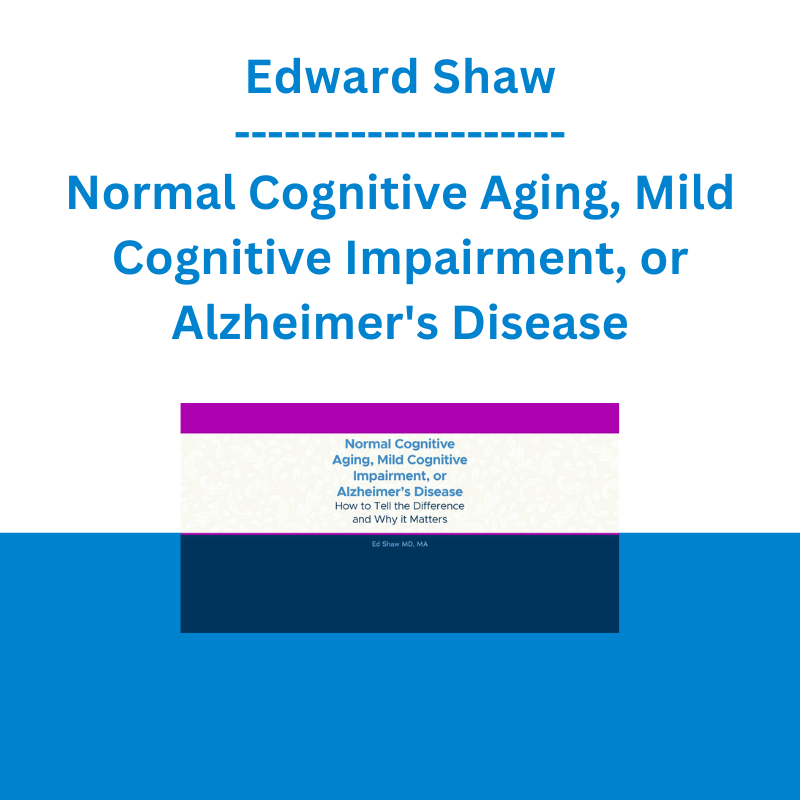*** Proof of Product ***
Exploring the Essential Features of “Edward Shaw – Normal Cognitive Aging, Mild Cognitive Impairment, or Alzheimer’s Disease: How to Tell the Difference and Why it Matters”
Speaker: Edward G. Shaw, MD, MA
Duration: 2 Hours 07 Minutes
Format: Audio and Video
Copyright: Jul 20, 2023
Media Type: Digital Seminar
Description
Often an aging patient or client will say and ask: “I just don’t remember as well as I used to … am I getting Alzheimer’s?”. Clinically, you must ask yourself, is this normal cognitive aging, mild cognitive impairment, or the early stage of Alzheimer’s disease or another form of dementia. In this session, we’ll review the basics of brain structure and function, describe the five main areas of cognition, learn about some office-based cognitive assessment instruments that require a few to 10-15 minutes to deliver and how to interpret them, identify the essential components of a dementia work-up including reversible causes of memory loss such as depression, and discuss why this matters given we now have three FDA-approved drugs to treat early Alzheimer’s. Informative yet practical, this session will equip you with knowledge and skills you can use in your practice setting starting today!
Speaker
Edward G. Shaw, MD, MA
Empath Education, LLC
Edward G. Shaw, MD, MA is dually trained as a physician and mental health counselor. He was the primary care partner for his late wife, Rebecca, who was diagnosed with early-onset Alzheimer’s disease in 2007 at age 53 and died in 2016 after a 9-year journey. Ed was a practicing academic radiation oncologist for 23 years, specializing in the treatment of adults and children with brain cancer. In 2010, inspired by Rebecca’s journey, his medical interest shifted to dementia diagnosis and treatment, and with his addition training in mental health counseling, he founded the Memory Counseling Program in 2011, part of the Section on Gerontology and Geriatric Medicine and the Sticht Center on Healthy Aging and Alzheimer’s Prevention at Atrium Health Wake Forest Baptist in Winston-Salem, North Carolina. The program serves individuals, couples, and families affected by Alzheimer’s disease or another type of dementia.
He is the author of four books. Along with coauthors Deborah Barr and Dr. Gary Chapman, he wrote Keeping Love Alive as Memories Fade: The 5 Love Languages and the Alzheimer’s Journey, which describes his moving personal story of care for Rebecca coupled with an innovative use of the 5 love languages in dementia counseling. He also wrote The Dementia Care Partner’s Workbook, a support group manual and self-study guide for dementia care partners, providing understanding, education, and hope for the long journey of dementia caregiving from diagnosis through end-of-life. He has also co-authored two resources for support group leaders, A Leader’s Manual for Dementia Care Partner Support Groups and A Support Group for People Living with Dementia: The Leaders Manual.
Speaker Disclosures:
Financial: Edward Shaw receives a speaking honorarium and recording royalties from PESI, Inc. He has no relevant financial relationships with ineligible organizations.
Non-financial: Edward Shaw has no relevant non-financial relationships.
Objectives
- Describe the structure and function of the brain’s frontal, temporal, parietal, and occipital lobes.
- Define the five main areas of cognitive function including attention and concentration, memory, executive function, language, and visuospatial function.
- Illustrate different office-based methods to assess cognitive function.
- Assess using the Mini-Mental Status Examination and Montreal Cognitive Function Assessment.
- Explain the components of a dementia work-up: history and exam, blood tests, blood and CSF biomarkers, cognitive function assessment, and structural and functional imaging studies.
- Explain why a correct diagnosis of normal cognitive aging, MCI, and AD matter for treatment decisions.
Outline
Structure and function of the brain lobes
- Frontal lobe
- Temporal lobe
- Parietal lobe
- Other: occipital lobe, brainstem, autonomic nervous system
The five main areas of cognition
- Attention and concentration
- Memory
- Executive function
- Language
- Visuospatial function
Cognitive function assessment
- 1-, 2- or 3-question very brief assessments
- MMSE – mini mental status exam
- MoCA – Montreal Cognitive Assessment
Components of a dementia work-up including depression assessment
- History and exam
- Mental health assessments
- Cognitive function assessments
- Blood tests
- Structural imaging: MRI
- Functional imaging : FDG-PET and Amyloid PET
The physiology of cognitive aging
- Characteristics of normal cognitive aging
- Symptoms of mild cognitive impairment
- Symptoms of Alzheimer’s disease and other forms of dementia
- Differentiating depression from dementia
Why it matters: anti-amyloid drug therapy – indications, benefits, and risks
- Aducanumab (Aduhelm) – first in class
- Other anti-amyloid drugs
- Other drugs on the horizon
Target Audience
- Nurse Practitioners
- Advance Practice Registered Nurses
- Nurses
- Physician Assistants
- Occupational Therapists
- Physical Therapists
- Speech Language Pathologists
- Nursing Home Administrators
- Social Workers
Please see the full list of alternative group-buy courses available here: https://lunacourse.com/shop/










 Alphashark - The AlphaShark SV-Scalper
Alphashark - The AlphaShark SV-Scalper